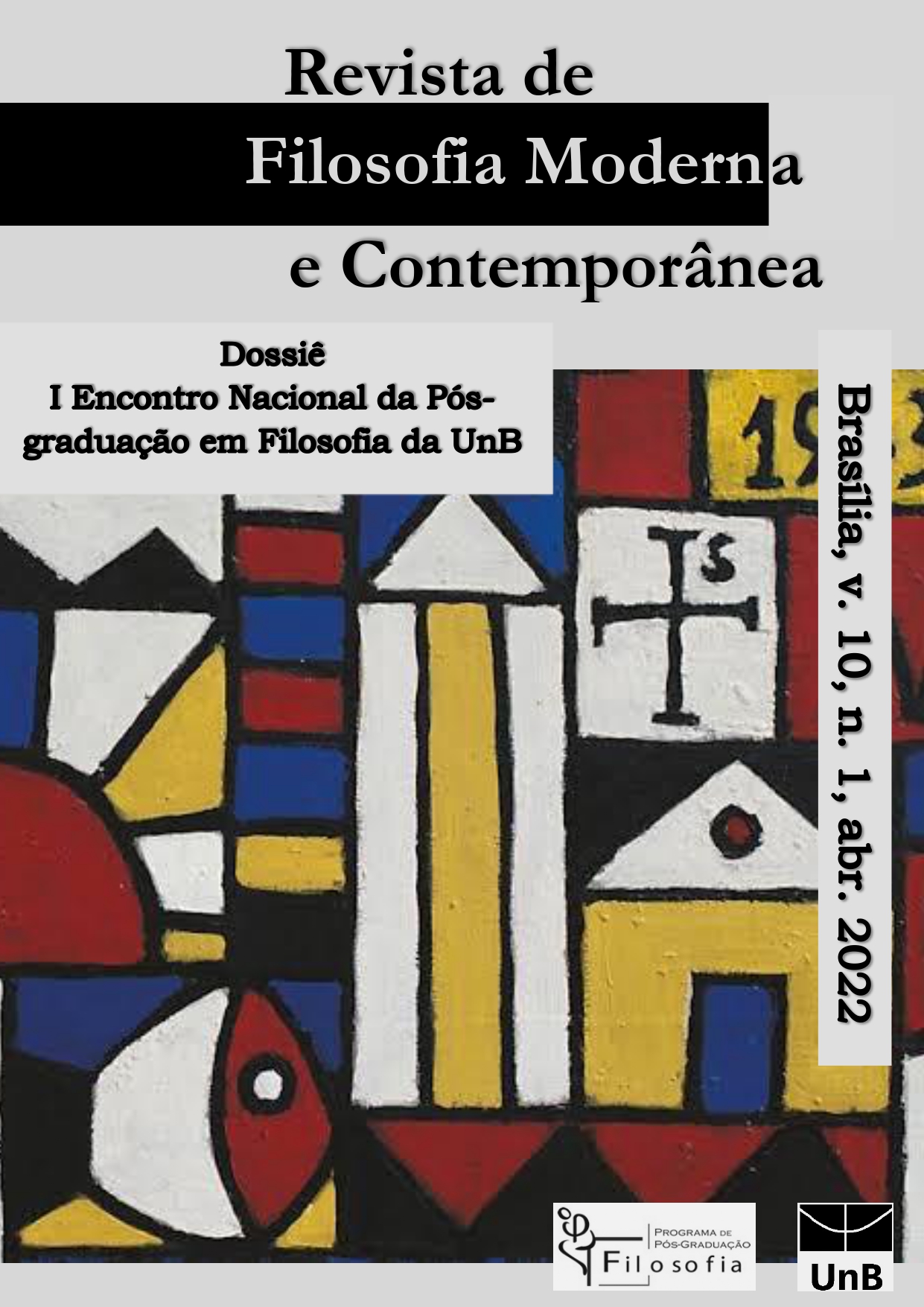Kant among French, English and Germans
Historical-Philosophical Guidelines of the Genesis of Kantian Anthropology (1rst Part)
DOI:
https://doi.org/10.26512/rfmc.v10i1.44173Keywords:
Kant. Anthropology. Ethics. History of Philosophy.Abstract
This paper aims to establish theoretical guidelines for understanding the relationship between ethics and anthropology in Kant's thought. Contrary to a particular line of interpretation dominant in specialized research on Kant, this article seeks to promote a historical-philosophical investigation, which contextualizes in Kant's thought the moment when three philosophical currents intersected, causing the guidelines of his debate about the concept of autonomy and perfectibility, namely: the philosophies of Hutcheson, Wolff and Rousseau. In this first part, Kant's discussion with Hutcheson and Wolff is discussed. From a more specific point of view, in this first part, the present article goes through Kant's reflections between 1755 and 1764 in order to present how the need to think about a relation between ethics and anthropology is constituted within Kantian thought.
Downloads
References
CASSIRER, Ernst. Kant’s Life and Thought. Trad. J. Harden. New Haven: Yale University Press, 1981.
CUNHA, B. L. A gênese da ética de Kant: o desenvolvimento moral pré-crítico em sua relação com a teodiceia. 1. ed. São Paulo: LiberArs, 2017.
________. ‘A demanda racional da ética de Kant no início de 1760’. In: Ethica, v. 16, p. 219-241, 2017. Disponível em [https://periodicos.ufsc.br/index.php/ethic/article/view/1677-2954.2017v16n2p219]: acessado em 262022.
HENRICH, Dieter: „Hutcheson und Kant“. Kant-Studien v.49. (1957), pp. 49-69.
HUTCHESON, Francis. Uma Investigação sobre o bem e o mal do ponto de vista da moral. Trad. Álvaro Cabral. In: Filosofia Moral Britânica: Textos do Século XVII. São Paulo: Editora da Unicamp, 2010.
KANT, Immanuel. Gesammelte Schriften Hrsg.: Bd. 1–22 Preussische Akademie der Wissenschaften, Bd. 23 Deutsche Akademie der Wissenschaften zu Berlin, ab Bd. 24 Akademie der Wissenschaften zu Göttingen. Berlin 1900ff.
________. Observações acerca do sentimento do belo e do sublime. Trad. de Artur Morão. Lisboa: Edições 70.
________. Ensaio para introduzir grandezas negativas em filosofia. Trad. Vinícius de Figueiredo e Jair Barboza. In: KANT, I. Escritos pré-críticos. São Paulo: Unesp, 2005.
________. Nova explicação dos primeiros princípios metafísicos do conhecimento metafísico. Trad. José Andrade. In: KANT, I. Textos pré-críticos. Seleção e Introdução de Rui Magalhães: Editora: Res, 1983.
________. Investigação sobre a evidência dos princípios da teologia natural e da moral. Trad. Luciano Codato. In: KANT, I. Escritos Pré-Críticos. São Paulo: Unesp, 2005.
SANTOS, Lionel Riberio dos. Que é o ser humano? Antropocosmologia do jovem Kant. In: O que é o ser humano? Antropologia, estética e teleologia em Kant. Lisboa: CFUL, 2010, pp.219-30.
SCHILPP, Paul Arthur. La Ética Pré-Crítica de Kant. Ciudad Universitaria: Universidad Nacional Autónoma de México, 1966.
SCHNEEWIND, Jeromé. A invenção da autonomia: uma história da filosofia moral moderna. São Leopoldo: Unisinos, 2001.
SCHÖNFELD, Martin. The Philosophy of The Young Kant: The Precritical Project. Oxford University Press, 2000.
SHELL, Susan Meld. Kant and Limits of Autonomy. London: Harvard University Press, 2009.
SUZUKI, Marcio. A forma e o sentimento do mundo: jogo, humor e arte de viver na filosofia do século XVIII. São Paulo: Editora 34, Fapesp, 2014.
VLEESCHAUWER, Herman. La Evolución del Pensamiento Kantiano. México: Universidad Nacional Autónoma de México, 1962.
WOLFF, Christian. Psychologia Empirica (1732). Reimpressão, Hildesheim, 1968.
________. Vernünftige Gedanken von der Menschen Tun und Lassen zu Beförderung ihrer Glückseligkeit (1720). Ed. Hans Werner Arndt. Reimpressão, Hildesheim, 1976
________. Vernünftige Gedanken von Gott, der Welt und der Seele der Menschen, auch alle Dingen Überhaupt (1719). Reimpressão, Hildesheim, 1983
Downloads
Published
Issue
Section
License
Copyright (c) 2022 Journal of Modern and Contemporary Philosophy

This work is licensed under a Creative Commons Attribution-NonCommercial-NoDerivatives 4.0 International License.
Copyright for articles published in this journal is retained by the authors, with first publication rights granted to the journal. By virtue of their appearance in this open access journal, articles are free to use, with proper attribution, in educational and other non-commercial settings.


